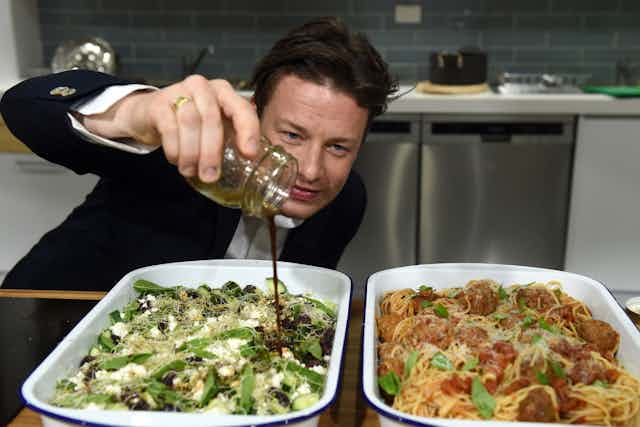More than a decade after being launched with a great fanfare of publicity, Jamie Oliver’s restaurant group has been taken into administration with the potential loss of up to 1,300 jobs. One person unlikely to be redundant, though, is Oliver himself, as the 43-year-old chef and television presenter will almost certainly continue with his television work and the sponsorship deals and advocacy work that his celebrity has brought him.
It is easy to be cynical about celebrity enterprises, whether they are built on real skill – as in the case of Oliver – real talent or pure celebrity status, as in the case of the Kardashians.
Admittedly he was lucky in getting his break while working at the River Cafe in west London where a film crew was making a documentary and identified his chirpy TV presence as the next big thing in TV chefs. As one commentator remarked at the time:
While some have been par-boiling for decades, young Jamie had put in a mere soupcon of an apprenticeship before his star quality was spotted at London’s famed River Cafe. Take one lad, sprinkle with some clever sexy marketing, add wacky camera angles, and hey presto, a fully-formed superchef is born.
But Oliver was – and is – a natural on television. And he has used his undoubted star power as an advocate to try to get people to understand about healthy eating – especially for children and young people – and the importance of home cooked food.
Various popular food brands have leveraged off his popularity and credibility. But his latest association with oil and gas company Shell certainly caused a lot of comment – and in the current climate change debate we doubtless have not heard the last of it.
The contradiction that he’ll be revamping the oil giant’s food offering is unmistakable to those concerned about climate change – he has been praised as an “environment champion” by the UN’s environment programme after years of campaigning, while Shell’s business plans don’t come close to doing what is required to address the climate crisis.
A lot on his plate
So enough of the man, what about his business skills? This is where it might be that the problem lies. While celebrities can and do move into other business for which they have not been trained – Victoria Beckham as fashion designer comes to mind – it is not an easy transition to go from being a TV personality to running what is effectively a large and complex hospitality business. While building a Michelin-starred restaurant such as Le Manoir aux Quatre Saisons requires high-end culinary skills, it is after all only one business. On the other hand, as Gordon Ramsay found, even having a few premium establishments is a tough business model.
Of course Oliver himself was not running the business on a day-to-day basis, but he was the driving force behind it and it may be that he did not have the experience or knowledge to recognise that a fashion for dining out is just that – probably temporary when the economy is on the up and people aren’t fearful for the future. At the same time people have been tightening their belts – literally and metaphorically – and while people are still buying food from restaurants, the number of people actually going on “dinner visits” is falling while the number of people taking advantage of the growth of food delivery companies is on the rise. For a branded restaurant chain like Jamie’s which is about the experience as much as the food, this is not good news.
When the business environment changes you have to be fleet of foot and either innovate your product – change it to meet the change in the environment – or at least drawback enough to reassess where to go next. The US restaurant market seems to be particularly good at this, for example, regularly remodelling one’s restaurant space and menu format. Fast expansion for a chain of restaurants is always risky, but – more specifically – here are some of the factors I consider to be key business problems for Oliver’s restaurant empire.
Hard to swallow
The restaurant business is tough. Every day small independents are closing. That has been the case for as long as I can remember – and many new restaurants close in their first year of trading.
The chain restaurant trade is newly highly competitive – over the last few years masses of new mid-market restaurants and cafes opened – Byron Burgers, Five Guys, Leon, Joe and the Juice and many more. The market is saturated and this is not like internet shopping where the world is your oyster – restaurants are service businesses that are geographically constrained. People have to get to them and every table not filled on a night is a loss.
Mass marketing a premium product is difficult. This is what Oliver said about the vision he had for his restaurants: “We launched Jamie’s Italian in 2008 with the intention of positively disrupting mid-market dining in the UK high street, with great value and much higher quality ingredients, best-in-class animal welfare standards and an amazing team who shared my passion for great food and service. And we did exactly that.”
But these values come with a price and it isn’t a price everyone can pay and those that can pay, cannot pay every day. Mass-market restaurant chains are far cheaper to run and have a much bigger target market – think McDonalds, Burger King, Greggs.
There is no doubt that a long stretch of economic uncertainty and low wage growth has been a factor in this story – but it cannot just be put down to that. Successfully running restaurants is hard and running a large number of them is a good deal harder. Being a brilliant young chef is one thing – running a business with thousands of employees and a multi-million pound turnover is quite another.

